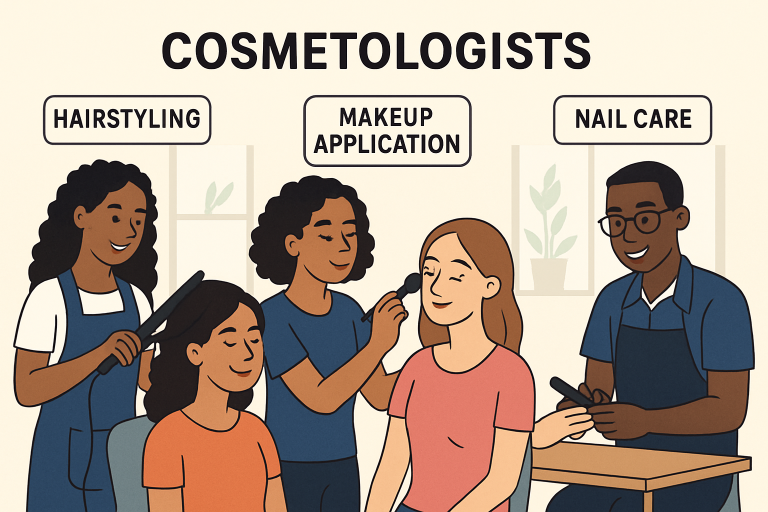Creative career paths in cosmetology: How beauty skills open doors
Table of contents
- The Expanding Role of Cosmetology Today
- Unexpected Career Options for Cosmetology Professionals
- Skills Developed Through Cosmetology Programs
- Cosmetology’s Connection to the Fashion Industry
- Becoming an Entrepreneur in the Beauty World
- Where Creativity Meets Technology
- The Impact of Beauty Professions on Local Communities
- What Does the Future Hold for Beauty Careers?
The expanding role of cosmetology today
Cosmetology has evolved well beyond the image of traditional salon services. Today, the possibilities within this field are vast and ever-changing, thanks to an ongoing shift in how society approaches self-care, wellness, and creative expression. Many are surprised to discover what is cosmetology in its modern sense: a career that puts trained professionals at the crossroads of art, science, and human connection.
From local salons to behind-the-scenes of major productions, cosmetologists are now a fixture in film, media, high-end fashion, and even the education industries. Societal trends and rising demand for personalized beauty services are reshaping the profession, with opportunities flourishing everywhere—backstage at prestigious events, within wellness retreats, and inside academic settings as instructors or curriculum designers.
According to the U.S. Bureau of Labor Statistics, job growth for cosmetologists remains strong, underlining the ongoing relevance and adaptability of the industry.
Unexpected career options for cosmetology professionals
While the familiar path for many in the field leads to thriving salons, a wealth of lesser-known career options awaits those with cosmetology training. Beyond cutting hair or applying makeup, beauty professionals excel as makeup artists for television, movie productions, and editorial magazine shoots. Others climb the ranks to become product developers for leading cosmetic brands or transition into education as trainers and mentors for the next generation of stylists.
Some creative souls branch out as event or bridal beauty coordinators, while others specialize as image consultants for corporate clients or public figures. Cosmetology expertise can lead to owning and managing spas, becoming creative directors for top fashion houses, and even shaping brand identities as beauty influencers on social media. The versatility of skills learned in the field opens doors to roles that combine artistry, science, and business.
Skills developed through cosmetology programs
A high-quality cosmetology program delivers more than technical instruction in skincare, nail artistry, and hairstyling. Students become adept at client communication, problem-solving, and cultivating a customer-first mindset. The profession demands precision, creativity, and a commitment to hygiene and safety.

Beyond the visible skills, cosmetology training fosters business sense—teaching foundational entrepreneurship, marketing, and management principles. Many schools now incorporate lessons in psychology, emphasizing the importance of trust-building and effective listening. These soft skills enable practitioners to adapt across multiple industries, enabling them to manage diverse clientele, troubleshoot rapidly, and excel in team environments.
Cosmetology’s connection to the fashion industry
The fashion world is intrinsically linked with creative talent from the beauty industry. Collaborations between stylists, makeup artists, and fashion designers result in the signature looks that dominate runways and set global trends. Significant events like New York and Paris Fashion Weeks are a testament to this synergy, with thousands of beauty professionals working tirelessly backstage to transform models and help designers communicate their creative visions.
These collaborations influence product launches and shape what eventually appears in beauty aisles and everyday routines. Their impact extends to mainstream pop culture, as runway looks inspire social media trends and influencer aesthetics. As reported by Vogue, beauty professionals are central to every major fashion show, proving just how intertwined these creative industries have become.
Becoming an entrepreneur in the beauty world
With creative expertise and business training, many cosmetology professionals launch successful ventures ranging from boutique salons to innovative product lines. The entrepreneurial spirit thrives in the beauty industry, empowered by digital marketing and social platforms that enable professionals to showcase portfolios, offer tutorials, and reach new customers worldwide.
Beauty entrepreneurship isn’t limited to physical locations. The growth of mobile and on-demand services, virtual consultations, and e-commerce opportunities underscores how accessible and lucrative these business paths can be. Individuals who blend creativity, technical know-how, and people skills are uniquely positioned to build brands, form loyal clienteles, and inspire others in the growing beauty landscape.
Where creativity meets technology
Advancements in technology are transforming the beauty profession, creating rich opportunities for innovation. Professionals now integrate virtual try-on tools, AI-powered skin analysis, and digital consultations into their services, allowing for more customized and efficient experiences. Aesthetic services like cosmetic tattooing, laser therapies, and personalized formulations demonstrate the intersection of science and art in modern cosmetology.
Staying ahead of tech trends is vital. As Allure highlighted, embracing digital platforms and new tools enables beauty professionals to offer contemporary and value-added services, ensuring continued relevance in a rapidly evolving market.
The impact of beauty professions on local communities
Cosmetologists have a profound effect on well-being and community spirit. Many practitioners dedicate time to volunteer work—offering complimentary services to the unemployed, individuals undergoing medical treatments, or people experiencing homelessness. Beauty professionals frequently partner with charitable organizations, schools, and local events to foster confidence and boost morale.
Workshops and outreach programs teach practical skills, promote self-esteem, and spark youth interest in creative careers. Through these efforts, cosmetologists improve outward appearances and build positive, inclusive, and connected communities.
What does the future hold for beauty careers?
The future of cosmetology is marked by innovation, specialization, and a growing focus on sustainability. Eco-friendly salons, green beauty product lines, and cruelty-free practices are now priorities as consumers and professionals become increasingly environmentally conscious. Services will continue to evolve in response to client demand for unique, personalized experiences.
Cosmetology’s adaptability ensures its future as a vibrant and essential industry. Individuals considering this path can look forward to diverse, creative, and rewarding opportunities—backed by growing demand for skilled professionals and fresh ideas.




